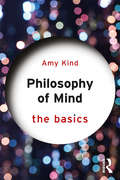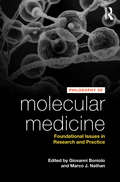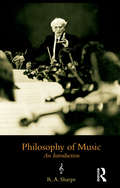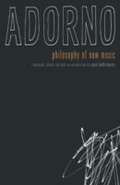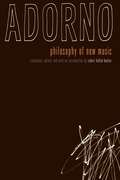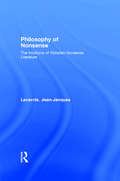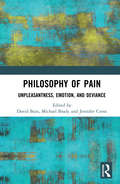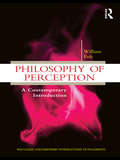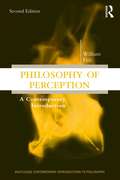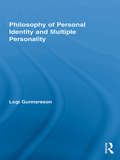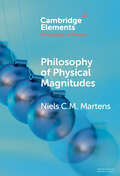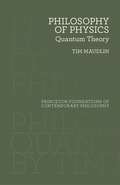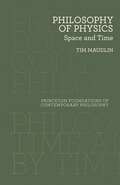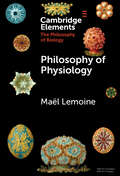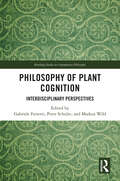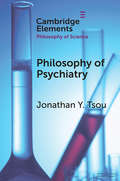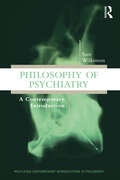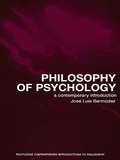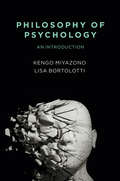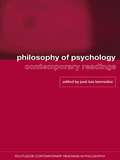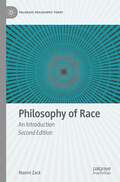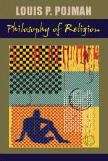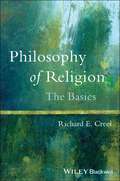- Table View
- List View
Philosophy of Mind: The Basics (The Basics)
by Amy KindPhilosophy of Mind: The Basics is a concise and engaging introduction to the fundamental philosophical questions and theories about the mind. The author Amy Kind, a leading expert in the field, examines central issues concerning the nature of consciousness, thought, and emotion. The book addresses key questions such as: What is the nature of the mind? What is the relationship between the mind and the brain? Can machines have minds? How will future technology impact the mind? With a glossary of key terms and suggestions for further reading, Philosophy of Mind: The Basics is an ideal starting point for anyone seeking a lively and accessible introduction to the rich and complex study of philosophy of mind.
Philosophy of Molecular Medicine: Foundational Issues in Research and Practice
by Giovanni Boniolo Marco J. NathanPhilosophy of Molecular Medicine: Foundational Issues in Theory and Practice aims at a systematic investigation of a number of foundational issues in the field of molecular medicine. The volume is organized around four broad modules focusing, respectively, on the following key aspects: What are the nature, scope, and limits of molecular medicine? How does it provide explanations? How does it represent and model phenomena of interest? How does it infer new knowledge from data and experiments? The essays collected here, authored by prominent scientists and philosophers of science, focus on a handful of mainstream topics in the philosophical literature, such as causation, explanation, modeling, and scientific inference. These previously unpublished contributions shed new light on these traditional topics by integrating them with problems, methods, and results from three prominent areas of contemporary biomedical science: basic research, translational and clinical research, and clinical practice.
Philosophy of Music: An Introduction
by R.A. SharpeThis lively and lucid introduction to the philosophy of music concentrates on the issues that illuminate musical listening and practice. It examines the conceptual debates relevant to the understanding and performing of music and grounds the philosophy to practical matters throughout. Ideal for a beginning readership with little philosophical background, the author provides an overview of the central debates enlivened by a real sense of enthusiasm for the subject and why it matters. The book begins by filling in the historical background and offers readers a succinct summary of philosophical thinking on music from the Ancient Greeks to Eduard Hanslick and Edmund Gurney. Chapter 2 explores two central questions: what is it that makes music, or, to be precise, some pieces of music, works of art? And, what is the work of music per se? Is it just what we hear, the performance, or is it something over and above that, something we invent or discover? Chapter 3 discusses a problem pecullar to music and one at the heart of philosophical discussion of it, can music have a meaning? And if so, what can it be? Chapter 4 considers whether music can have value. Are there features about music that make it good, features which can be specified in criteria? Is a work good if and only if it meets with the approval of an ideally qualified listener? How do we explain differences of opinion? Indeed, why do we need to make judgements of the relative value of pieces of music at all? This engaging and stimulating book will be of interest to students of aesthetics, musical practitioners and the general reader looking for a non-technical treatment of the subject.
Philosophy of New Music
by Theodor W. Adorno Robert Hullot-KentorIn 1947 Theodor Adorno, one of the seminal European philosophers of the postwar years, announced his return after exile in the United States to a devastated Europe by writing Philosophy of New Music. Every aspect of this work was met with extreme reactions, from stark dismissal to outrage. Despite the controversy, Philosophy of New Music became highly regarded and widely read among musicians, scholars, and social philosophers.
Philosophy of New Music
by Theodor W. AdornoAn indispensable key to Adorno&’s influential oeuvre—now in paperbackIn 1949, Theodor W. Adorno&’s Philosophy of New Music was published, coinciding with the prominent philosopher&’s return to a devastated Europe after his exile in the United States. Intensely polemical from its first publication, every aspect of this work was met with extreme reactions, from stark dismissal to outrage. Even Arnold Schoenberg reviled it. Despite the controversy, Philosophy of New Music became highly regarded and widely read among musicians, scholars, and social philosophers. Marking a major turning point in his musicological philosophy, Adorno located a critique of musical reproduction as internal to composition, rather than a matter of musical performance. Consisting of two distinct essays, &“Schoenberg and Progress&” and &“Stravinsky and Reaction,&” Philosophy of New Music poses the musical extremes in which Adorno perceived the struggle for the cultural future of Europe: between human emancipation and barbarism, between the compositional techniques and achievements of Schoenberg and Stravinsky. In this translation, which is accompanied by an extensive introduction by distinguished translator Robert Hullot-Kentor, Philosophy of New Music emerges as an essential guide to the whole of Adorno's oeuvre.
Philosophy of Nonsense: The Intuitions of Victorian Nonsense Literature
by Jean-Jacques Lecercle'Jean-Jacques Lecercle's remarkable Philosophy of Nonsense offers a sustained and important account of an area that is usually hastily dismissed. Using the resources of contemporary philosophy - notably Deleuze and Lyotard - he manages to bring out the importance of nonsense' - Andrew Benjamin, University of Warwick Why are we, and in particular why are philosophers and linguists, so fascinated with nonsense? Why do Lewis Carroll and Edward Lear appear in so many otherwise dull and dry academic books? This amusing, yet rigorous new book by Jean-Jacques Lecercle shows how the genre of nonsense was constructed and why it has proved so enduring and enlightening for linguistics and philosophy.
Philosophy of Pain: Unpleasantness, Emotion, and Deviance (Routledge Handbooks In Philosophy Ser.)
by Michael Brady Jennifer Corns David BainOver recent decades, pain has received increasing attention as philosophers, psychologists, and neuroscientists try to answer deep and difficult questions about it. What is pain? What makes pain unpleasant? How is pain related to the emotions? This volume provides a rich and wide-ranging exploration of these questions and important new insights into the philosophy of pain. Divided into three clear sections – pain and motivation, pain and emotion, and deviant pain – the collection covers fundamental topics in the philosophy and psychology of pain. These include pain and sensory affect, the neuroscience of pain, pain and rationality, placebos, and pain and consciousness. Philosophy of Pain: Unpleasantness, Emotion, and Deviance is essential reading for students and researchers in philosophy of mind, philosophy of psychology, cognitive and behavioral psychology, as well as those in health and medicine researching conceptual issues in pain.
Philosophy of Particle Physics (Elements in the Philosophy of Physics)
by Porter WilliamsThis Element offers an introduction to selected philosophical issues that arise in contemporary particle physics, aimed at philosophers who have limited prior exposure to quantum field theory. One the one hand, it critically surveys philosophical work on the representation of particles in quantum field theory, the formal machinery and conceptual implications of renormalization and renormalization group methods, and ontological and methodological questions raised by the use of effective field theory techniques in particle physics. On the other, it identifies topics in particle physics that have not yet received philosophical attention and sketches avenues for philosophical analysis of those topics. The primary aim of the Element is to provide philosophers of physics with an entry point into the literature on the philosophy of particle physics and identify interesting directions for future research for students and researchers alike.
Philosophy of Perception: A Contemporary Introduction
by William FishThe philosophy of perception investigates the nature of our sensory experiences and their relation to reality. Raising questions about the conscious character of perceptual experiences, how they enable us to acquire knowledge of the world in which we live, and what exactly it is we are aware of when we hallucinate or dream, the philosophy of perception is a growing area of interest in metaphysics, epistemology, and philosophy of mind. William Fish’s Philosophy of Perception introduces the subject thematically, setting out the major theories of perception together with their motivations and attendant problems. While providing historical background to debates in the field, this comprehensive overview focuses on recent presentations and defenses of the different theories, and looks beyond visual perception to take into account the role of other senses. Topics covered include: the phenomenal principle perception and hallucination perception and content sense-data, adverbialism and idealism disjunctivism and relationalism intentionalism and combined theories the nature of content veridicality perception and empirical science non-visual perception. With summaries and suggested further reading at the end of each chapter, this is an ideal introduction to the philosophy of perception.
Philosophy of Perception: A Contemporary Introduction (Routledge Contemporary Introductions to Philosophy)
by William FishThe philosophy of perception investigates the nature of our sensory experiences and their relation to reality. In the second edition of this popular book, William Fish introduces the subject thematically, setting out the major theories of perception together with their motivations and attendant problems. While providing historical background to debates in the field, this comprehensive overview focuses on recent presentations and defenses of the different theories, and looks beyond visual perception to take into account the role of other senses. The second edition organizes the contents into two main parts: the first deals with philosophical theories of perception, and the second covers key topics and issues in perception as they are discussed in philosophy, cognitive science, and psychology. Two completely new chapters have been added – one on color and color vision; and a second on the interaction between sense modalities – and other chapters have been significantly updated to include discussion of topics such as pre-twentieth-century philosophy of perception, phenomenal intentionality, color adverbialism, predictive processing approaches to perception, ecological approaches to perception, and in-depth discussions of the non-visual senses. Additional updates include fuller and easier-to-understand explanations of some important views that were glossed over in the first edition and greater coverage of research from the last 25 years. All chapter summaries, references, and Suggested Reading lists at the end of each chapter have been brought up to date and the volume now includes a more extensive index at the back of the book. Key Features and Benefits: The only single-authored textbook on philosophy of perception currently available Devoted to contemporary theories and topics, but with appropriate historical coverage for fuller understanding of contemporary work Each chapter includes a chapter overview, questions for further consideration, and an annotated list of Suggested Readings Includes coverage of topics like: - the phenomenal principle- perception and hallucination- perception and content- naïve realism and disjunctivism - intentionalism and representationalism- the nature of content- qualia theories and phenomenal intentionality- perception and empirical science- color and color science- theories of non-visual perception- Molyneux’s problem- cross-modal illusions- multimodality Key Changes to the Second Edition The division of the book into two major parts: Part I on philosophical theories of perception, Part II on key interdisciplinary topics in perception The addition of two new chapters on color and color vision, and interaction between different sense modalities More topics from the last 25 years of philosophy of perception Combined chapters on belief acquisition theories and intentional theories into one larger chapter More material on the growing intersection of the philosophy and psychology of perception Includes coverage of Molyneux’s problem and of cross-modal illusions Updated chapter summaries, references, and Suggested Reading lists at the end of each chapter A summary table and a more extensive index
Philosophy of Personal Identity and Multiple Personality (Routledge Studies in Contemporary Philosophy)
by Logi GunnarssonAs witnessed by recent films such as Fight Club and Identity, our culture is obsessed with multiple personality—a phenomenon raising intriguing questions about personal identity. This study offers both a full-fledged philosophical theory of personal identity and a systematic account of multiple personality. Gunnarsson combines the methods of analytic philosophy with close hermeneutic and phenomenological readings of cases from different fields, focusing on psychiatric and psychological treatises, self-help books, biographies, and fiction. He develops an original account of personal identity (the authorial correlate theory) and offers a provocative interpretation of multiple personality: in brief, "multiples" are right about the metaphysics but wrong about the facts.
Philosophy of Physical Magnitudes (Elements in the Philosophy of Physics)
by Niels C. MartensDimensional quantities such as length, mass and charge, i.e., numbers combined with a conventional unit, are essential components of theories in the sciences, especially physics, chemistry and biology. Do they represent a world with absolute physical magnitudes, or are they merely magnitude ratios in disguise? Would we notice a difference if all the distances or charges in the world suddenly doubled? These central questions of this Element are illustrated by imagining how one would convey the meaning of a kilogram to aliens if one were only allowed to communicate via Morse code.
Philosophy of Physics: Quantum Theory (Princeton Foundations Of Contemporary Philosophy Ser. #19)
by Tim MaudlinA sophisticated and original introduction to the philosophy of quantum mechanics from one of the world’s leading philosophers of physicsIn this book, Tim Maudlin, one of the world’s leading philosophers of physics, offers a sophisticated, original introduction to the philosophy of quantum mechanics. The briefest, clearest, and most refined account of his influential approach to the subject, the book will be invaluable to all students of philosophy and physics.Quantum mechanics holds a unique place in the history of physics. It has produced the most accurate predictions of any scientific theory, but, more astonishing, there has never been any agreement about what the theory implies about physical reality. Maudlin argues that the very term “quantum theory” is a misnomer. A proper physical theory should clearly describe what is there and what it does—yet standard textbooks present quantum mechanics as a predictive recipe in search of a physical theory.In contrast, Maudlin explores three proper theories that recover the quantum predictions: the indeterministic wavefunction collapse theory of Ghirardi, Rimini, and Weber; the deterministic particle theory of deBroglie and Bohm; and the conceptually challenging Many Worlds theory of Everett. Each offers a radically different proposal for the nature of physical reality, but Maudlin shows that none of them are what they are generally taken to be.
Philosophy of Physics: Space and Time (Princeton Foundations of Contemporary Philosophy #11)
by Tim MaudlinPhilosophical foundations of the physics of space-timeThis concise book introduces nonphysicists to the core philosophical issues surrounding the nature and structure of space and time, and is also an ideal resource for physicists interested in the conceptual foundations of space-time theory. Tim Maudlin's broad historical overview examines Aristotelian and Newtonian accounts of space and time, and traces how Galileo's conceptions of relativity and space-time led to Einstein's special and general theories of relativity. Maudlin explains special relativity with enough detail to solve concrete physical problems while presenting general relativity in more qualitative terms. Additional topics include the Twins Paradox, the physical aspects of the Lorentz-FitzGerald contraction, the constancy of the speed of light, time travel, the direction of time, and more.Introduces nonphysicists to the philosophical foundations of space-time theoryProvides a broad historical overview, from Aristotle to EinsteinExplains special relativity geometrically, emphasizing the intrinsic structure of space-timeCovers the Twins Paradox, Galilean relativity, time travel, and moreRequires only basic algebra and no formal knowledge of physics
Philosophy of Physiology (Elements in the Philosophy of Biology)
by Maël LemoineTime is ripe to complement the question 'what is health and disease?' in philosophy of medicine with a 'philosophy of physiology.' Indeed, the actors in this debate share the conviction that a 'foundational' concept dictates to this scientific field what is to be considered healthy or pathological and leaves it to explore only facts and mechanisms. Rejecting this presupposition, philosophy of physiology accepts that biomedical sciences explore and redefine their own object: the healthy, the pathological. Indeed, various theories of disease and health, that philosophers have rarely studied, form the core of biomedical research, too hastily considered as a science 'without theories.' The Element identifies them, and clarifies their content, presuppositions, and scope. Finally, it proposes a new question about the unity of the pathological phenomenon: not 'what do all diseases have in common?' but rather, 'why is the susceptibility to disease a universal and necessary characteristic of living beings?'
Philosophy of Plant Cognition: Interdisciplinary Perspectives (Routledge Studies in Contemporary Philosophy)
by Gabriele Ferretti, Peter Schulte, and Markus WildThis volume features new research about the philosophy of plant intelligence and plant cognition, one of the most intriguing and complex current debates at the intersection of biology, cognitive science and philosophy.The debate about plant cognition is marked by deep disagreements. Some theorists are confident that the empirical evidence supports the ascription of cognitive capacities to plants. Others hold that such claims are overblown, and defend more traditional, non-cognitive accounts of plant behavior. Still others seek to formulate intermediate positions. This volume brings together leading researchers from across this theoretical spectrum to tackle the foundational questions that are at issue in the debate about plant cognition. The contributions focus on the philosophical questions raised by recent discoveries and controversies in the empirical sciences, such as: Can plants be said to have genuine cognitive abilities? Can they be characterized as representing or perceiving their environment, as pursuing goals, or even as having some form of conscious experience? Which data could provide evidence for such characterizations? And what are possible implications of these issues for general questions about the nature of cognition, representation, perception, and consciousness?Philosophy of Plant Cognition will be of interest to scholars and students working in philosophy of mind, philosophy of biology, cognitive science, and plant biology.
Philosophy of Psychiatry (Elements in the Philosophy of Science)
by Jonathan Y. TsouJonathan Y. Tsou examines and defends positions on central issues in philosophy of psychiatry. The positions defended assume a naturalistic and realist perspective and are framed against skeptical perspectives on biological psychiatry. Issues addressed include the reality of mental disorders; mechanistic and disease explanations of abnormal behavior; definitions of mental disorder; natural and artificial kinds in psychiatry; biological essentialism and the projectability of psychiatric categories; looping effects and the stability of mental disorders; psychiatric classification; and the validity of the DSM's diagnostic categories. The main argument defended by Tsou is that genuine mental disorders are biological kinds with harmful effects. This argument opposes the dogma that mental disorders are necessarily diseases (or pathological conditions) that result from biological dysfunction. Tsou contends that the broader ideal of biological kinds offers a more promising and empirically ascertainable naturalistic standard for assessing the reality of mental disorders and the validity of psychiatric categories.
Philosophy of Psychiatry: A Contemporary Introduction (Routledge Contemporary Introductions to Philosophy)
by Sam WilkinsonThis is the first introductory textbook of its kind devoted to philosophy of psychiatry, offering a thorough and accessible investigation of the conceptual and philosophical problems at the heart of psychiatric practice and research. While it applies some of the long-standing concerns of philosophy to the mental health professions, it also investigates philosophical problems and issues that have arisen more recently from careful examination of psychiatric phenomena. Divided into two parts, Philosophy of Psychiatric Practice and Research and Philosophy and Psychopathology, the book’s 12 chapters cover topics like the ontological status of mental illness, philosophical issues in diagnosis, the role of culture in psychiatry and the relationship between mental illness and personal identity, as well as explore foundational problems in studying well-known psychopathologies like schizophrenia, depression and addiction. All chapters include initial overviews and concluding summaries and a list of suggested readings. Key Features Two-part structure – divided between (1) philosophy of psychiatric practice and research, and (2) philosophy and psychopathology – presents a clear, yet distinctive picture of the field Offers a unified style and vision throughout, with easy-to-follow segues from chapter to chapter Pedagogical features include chapter overviews and summaries, discussion questions and sections for further reading
Philosophy of Psychology: A Contemporary Introduction
by Jose Luis BermudezJosé Luis Bermúdez introduces the philosophy of psychology as an interdisciplinary exploration of the nature and mechanisms of cognition. Philosophy of Psychology charts out four influential 'pictures of the mind' and uses them to explore central topics in the philosophical foundations of psychology, including the relation between different levels of studying the mind/brain; the nature and scope of psychological explanation; the architecture of cognition; and the relation between thought and language. Chapters cover all the core concepts, including: models of psychological explanation the nature of commonsense psychology arguments for the autonomy of psychology functionalist approaches to cognition computational models of the mind neural network modeling rationality and mental causation perception, action and cognition the language of thought and the architecture of cognition. Philosophy of Psychology: A Contemporary Introduction is a very clear and well-structured textbook from one of the leaders in the field.
Philosophy of Psychology: An Introduction
by Lisa Bortolotti Kengo MiyazonoAre we rational creatures? Do we have free will? Can we ever know ourselves? These and other fundamental questions have been discussed by philosophers over millennia. But recent empirical findings in psychology and neuroscience suggest we should reconsider them. This textbook provides an engrossing overview of contemporary debates in the philosophy of psychology, exploring the ways in which the interaction and collaboration between psychologists and philosophers contribute to a better understanding of the human mind, cognition and behaviour. Miyazono and Bortolotti discuss pivotal studies in cognitive psychology, social psychology, developmental psychology, evolutionary psychology, clinical psychology and neuroscience, and their implications for philosophy. Combining the latest philosophical and psychological research with an accessible style, Philosophy of Psychology is a crucial resource for students from either discipline. It is the most up-to-date text for modules on philosophy of mind, philosophy of psychology, philosophy of mental health and philosophy of cognitive science.
Philosophy of Psychology: Contemporary Readings (Routledge Contemporary Readings in Philosophy)
by Jose Luis BermudezPhilosophy of Psychology: Contemporary Readings is a comprehensive anthology that includes classic and contemporary readings from leading philosophers. Addressing in depth the major topics within philosophy of psychology, the editor has carefully selected articles under the following headings: pictures of the mind commonsense psychology representation and cognitive architecture. Articles by the following philosophers are included: Blackburn, Churchland, Clark, Cummins, Dennett, Davidson, Fodor, Kitcher, Lewis, Lycan, McDowell, McLeod, Rey, Segal, Stich. Each section includes a helpful introduction by the editor which aims to guide the student gently into the topic. The book is highly accessible and provides a broad-ranging exploration of the subject, including discussion of the leading philosophers in the field. Ideal for any student of philosophy of psychology or philosophy of mind.
Philosophy of Race: An Introduction (Palgrave Philosophy Today)
by Naomi ZackPhilosophy of Race: An Introduction provides plainly written access to a new subfield that has been in the background of philosophy since Plato and Aristotle. The second edition is updated to include contemporary developments such as digital racisms, metaphysical othering and metaphysical racism, and the rise of populist movements. Its focus has also been expanded to address non-white racial groups in the Americas, Europe, and beyond, such as the Roma and Uighur people. Part I provides an overview of ideas of race and ethnicity in the philosophical canon, egalitarian traditions, race in biology, and race in American and Continental Philosophy. Part II addresses race as it operates in life through colonialism and development, social constructions and institutions, racism, political philosophy, gender, and populist movements. This book constructs an outline that will serve as a resource for students, nonspecialists, and general readers in thinking, talking, and writing about philosophy of race.
Philosophy of Religion
by John CottinghamReligious belief is not just about abstract intellectual argument; it also impinges on all aspects of human life. John Cottingham's Philosophy of Religion opens up fresh perspectives on the philosophy of religion, arguing that the detached neutrality of much of contemporary philosophizing may be counterproductive - hardening us against the receptivity required for certain kinds of important evidence to become salient. This book covers all the traditional areas of the subject, including the meaning of religious claims, the existence of God and the relation between religion and morality, as well as the role of spiritual praxis and how religious belief affects questions about the meaning of life, human suffering and mortality. While preserving the clarity and rigor that are rightly prized in the analytic tradition, the book also draws on insights from literary and other sources, and aims to engage a wide readership.
Philosophy of Religion
by Louis J. PojmanThe author's goal in writing this book in philosophy of religion is to produce a text which is analytically rigorous, accessible to students, and balanced in presentation and which covers the major issues, ranging from the traditional arguments for and against the existence of God through personal identity and immortality to the questions of the relationship between faith and reason and the relationship between morality and religion.
Philosophy of Religion
by Richard E. CreelPhilosophy of Religion: The Basics offers a concise introduction to philosophy of religion, distilling key discussions and concepts of the subject to their succinct essence, providing a truly accessible entry into the subject.A truly accessible introduction to philosophy of religion for beginnersTakes a topical approach, starting with the nature of religion and moving the reader through the major concepts, explaining how topics connect and point to one anotherOffers a thorough and full treatment of diverse conceptions of God, the ontological argument, and divine attributes and dilemmasA genuinely concise introduction, this text can be used alongside other resources without overtaxing studentsRepresents 30 years of experience teaching to undergraduatesIncludes a free downloadable file with key excerpts and additions to help students study
